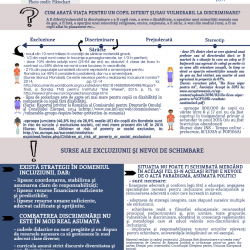The True Education
Since I promised that I will write a few lines for a project that made me more aware of my ignorance in relation to the manner in which the education beyond the school gate tells the world that lies on the other side, I am living somehow in a state of uncertainty. Why? I was a student too and in a good extent, I still am. Then why it is so hard to give an outline to an overwhelming sensation that I have ever since I realized that a proper education can open your eyes?
Instead of teaching us how to use all our senses to develop thinking and creativity and to shape our minds, the school nowadays wants at all costs to bring us to the majority, to not stand out from the crowd and the standardize our spirit. Again ”Why?”. When each of us is unique, this means that everyone is a minority, and to try to create a majority or unanimous thinking summing unique personalities, can only be a disaster. The society is composed of different entities and to accentuate those differences to the point where it develops a type leads to countless contradictions. The right education should integrate these separate entities so as to highlight the uniqueness of each of us. Ant method that tabulates the children according to their skills, talents or different personalities, only serves to put more emphasis on the differences between them, so helping to create divisions in the society.
The right education does not consist in imposing the ideals considered good by someone or in complying with some values that do not arouse a feeling of respect or admiration, but consists in helping the student to discover the ideals that they want to achieve, to create new values in which he can believe.
How easy would it be if education would only depend on us, if someone shouldn’t be willing to give it to us. But, like any other thing in life, education too depends on someone else, and if we are fortunate to find the right person, this process would be a valuable one, which will help us grow spiritually.
I have always believed in an educational system based on dedication, on love, on the desire to leave something behind. The moment I realized the important role that school had in my life was when I, involuntarily, called my teacher ”mom”. That was when I realized the importance of the mission that she had and, as the years passed, I started to believe that the relationship between a student and his teacher should be based on deep admiration. In other words, the teacher must be able to awake in his students a feeling of admiration for him and a desire to always seek people who inspire them and who can guide them.
This kind of dedication occurs when the educator isn’t attached to a method, but, even in lack of time, seeks to analyse every student individually in order to come up with solutions specially created for him.
Gabriel Săndoiu, professor of philosophy, said ”there is only one way to teach (the rest is pedagogy, which means nonsenses, hypocrisy): through fascination.” The fascination only appears when the teachers are sure of their vocation and of the interest that they have in relation to their work, because the right education is not carried out by enforcement and not even by persuasion. It is achieved through communication.
Speaking of communication, I feel the need to share an experience that confirmed me once again that the educational system built on a relationship student-teacher based on communication, problematization and doubt will attract more followers. As a student, I had a chance that not many have: to compare two systems of education in the same field, but with teaching ways as different as they could be: one focuses on rendering the information, on the intercession of superficial formulas, while the other teaches the student how to think, to dare to ask questions and to find answers. I have found out with no trace of surprise that the auditoriums are fuller in the second case, the students are more willing to interact with their teachers and to create lasting ties. When asking questions you discover yourself, you realize what’s missing and you enrich yourself.
Since childhood, we are prone to asking questions: most children are curious by nature, they want to know more, only that moreover their persistent questions are repressed by the fanciful claims of adults, their lack of patience, their inconsiderate way to stop their curiosity. The adults don’t encourage the children’s desire to ask, they don’t feed their curiosity, as they fear their questions. Is even worse when this tradition continues in the academic environment.
Conformism and submission to certain opinions exposed by those who should teach us don’t have place in a right education. The cooperation between student and teacher means communication and this is impossible unless there is a relationship based on trust and mutual respect. The teacher cannot claim respect from his students as long as he doesn’t develop a relationship based on the same feeling. The cultivation of respect for each other is the essence of education, but if the educator does not possess that quality himself, he cannot help his students to reach an integrated life.
In the same category of practices to avoid in the educational environment we find the perpetuation of fear and discipline, as it is easier to hold the baby’s hand, but this doesn’t contribute al all to the understanding of the problems that life will arise. A specific form of coercion through a discipline that is based on rewards and punishments can only maintain an apparent calm. The right education cultivates freedom and intelligence, which is not possible under any form of coercion that accompanies fear. Fear is a cause of why the young don’t express themselves: fear of mistake, fear of seeming ridiculous, fear of making a fool of yourself are feelings that quell the desire to affirm yourself, to communicate, to ask questions. Thus we arrive again at the problem of communication in the learning process.
The learning process doesn’t really begin until we discover ourselves, and in my opinion, this should be the mission of the teachers. ”Only an education based on self-knowledge can offer freedom. Perfect adaptation to any society, any promise of future utopias cannot give the individual the inner vision required to leave the state of conflict.” (Jiddu Krishnamurti, author of the book ”On education”). A good education should help the young to know through experience the process of life. Life cannot be made to conform to any system, and a mind that was educated only in terms of theory is unable to tackle life with all its diversities, subtleties and depths. The highest position that education has in our lives is, precisely, to create individuals able to see life in its true sense, not just through analyses learned from books.
Education is a lever in the transmission of aspects leading to our development as individuals and to the creation of new cultures. This transmission is a whole transformation process of the young man to whom is given the opportunity to become aware of his own thoughts and experiences. Education should put the student on the forefront, to offer him the opportunity to discover and to mature, to establish fair relationships with his peers and with nature.
The years that a student spends in school, must give him a feeling of enchantment and a pleasant flavor. This can only happen when there is coercion, when the educator and the student participate in the act of learning.
by Tatiana Șoldănescu
Tatiana-Lăcrămioara Șoldănescu is a 3rd year student at the Faculty of Law at the University of Bucharest and she volunteered for the campaign ”Education without discrimination is also my business!”. Tatiana felt since she was in middle school that her future has to be related to respecting the human rights before the law through the establishment of a quality justice as a judge.









